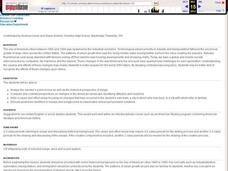National Endowment for the Humanities
American Utopia: The Architecture and History of the Suburb
Let's build a dream house! By examining promotional materials and photographs of early suburban developments, scholars consider what led to the development of this particular American dream. The resource includes case studies of three...
Curated OER
Post-War Suburbanization: Causes and Interpretations
In this teaching American history worksheet, high schoolers examine a primary source document regarding post-World War II suburbanization. Students discuss their impressions of the document.
National Wildlife Federation
Quantifying Land Changes Over Time Using Landsat
"Humans have become a geologic agent comparable to erosion and [volcanic] eruptions ..." Paul J. Crutzen, a Nobel Prize-winning atmospheric chemist. Using Landsat imagery, scholars create a grid showing land use type, such as urban,...
Curated OER
You Don’t Know What You’ve Got Until It’s Gone: The Changing American Landscape
Young scholars examine the changing American landscape. In this cause and effect lesson, students listen to rock music that exemplifies urban growth in America and the interconnectedness of America today. Young scholars write cause and...
Curated OER
Urbanization
Students examine the impact of urban change. In this Indiana history lesson plan, students read excerpts of The World Does Move by Booth Tarkington and then research the noted Web sites about the urbanization of Indianapolis. Students...
Curated OER
A New Way of Looking
Learners compare and contrast works of art. In this art analysis lesson, students complete art analysis discussion activities and then journal activities.
Rock and Roll Hall of Fame
Rock & Roll Hall of Fame: Sti Lesson 15: The Changing American Landscape
The rise of American cities between 1865 and 1900 was spawned by the industrial revolution. Technological advancements in industry and transportation fathered the enormous growth of large cities across the United States. This led to the...








